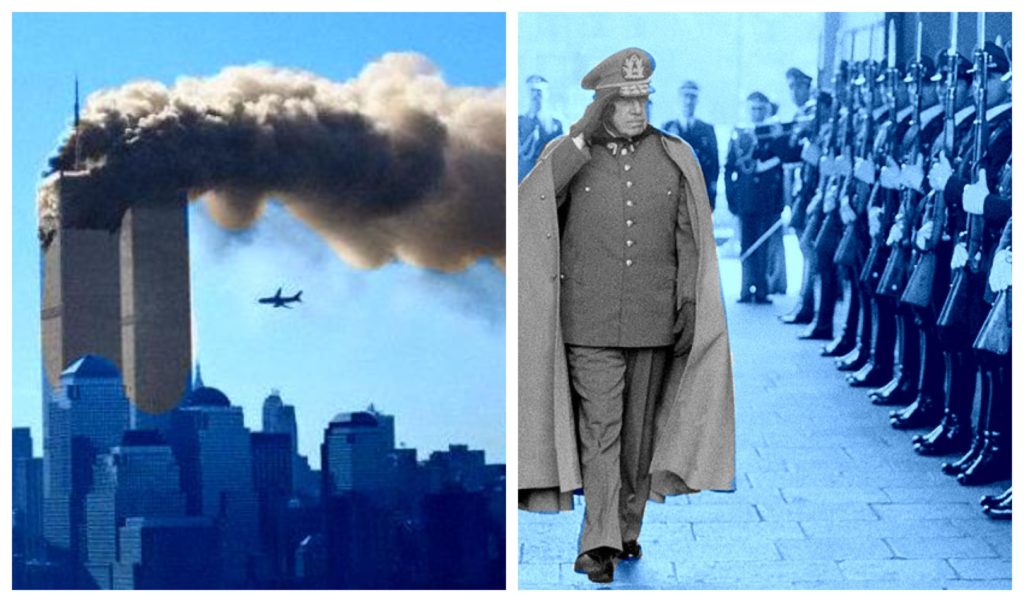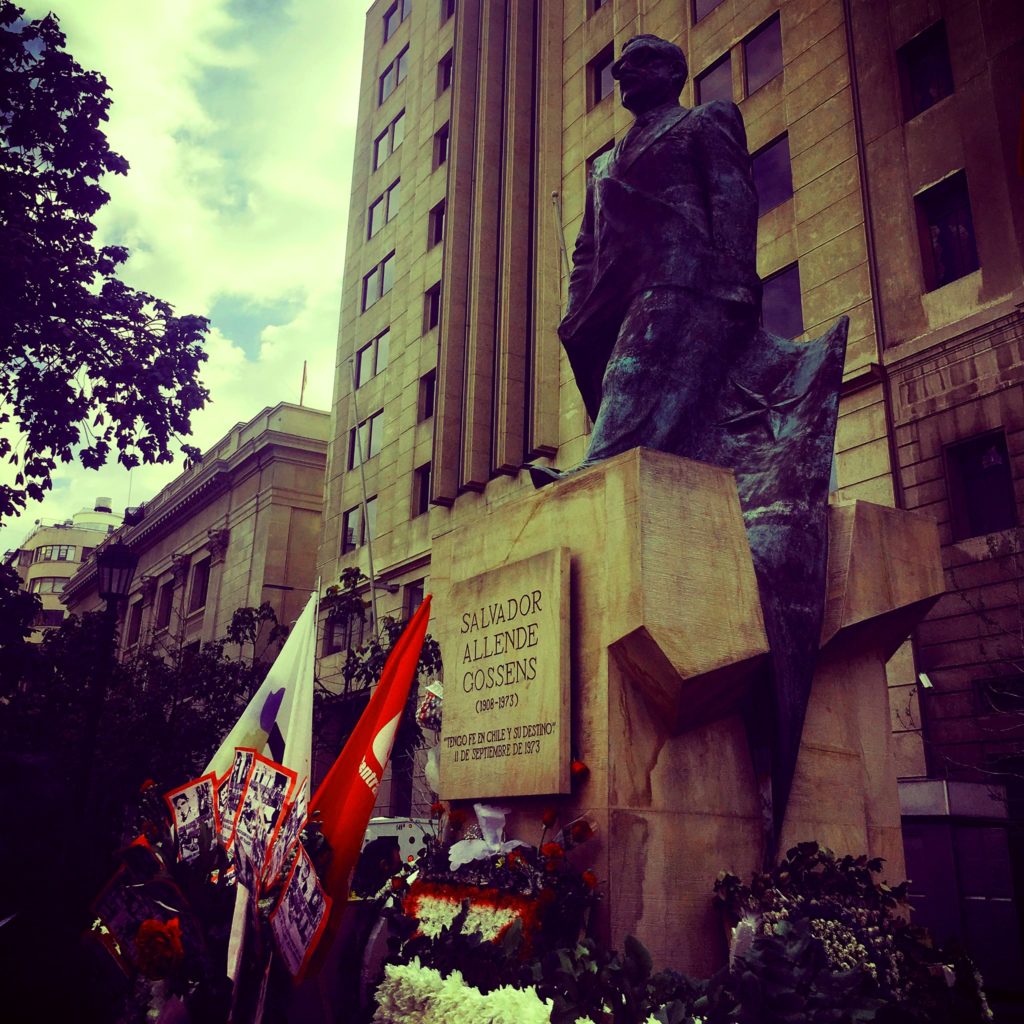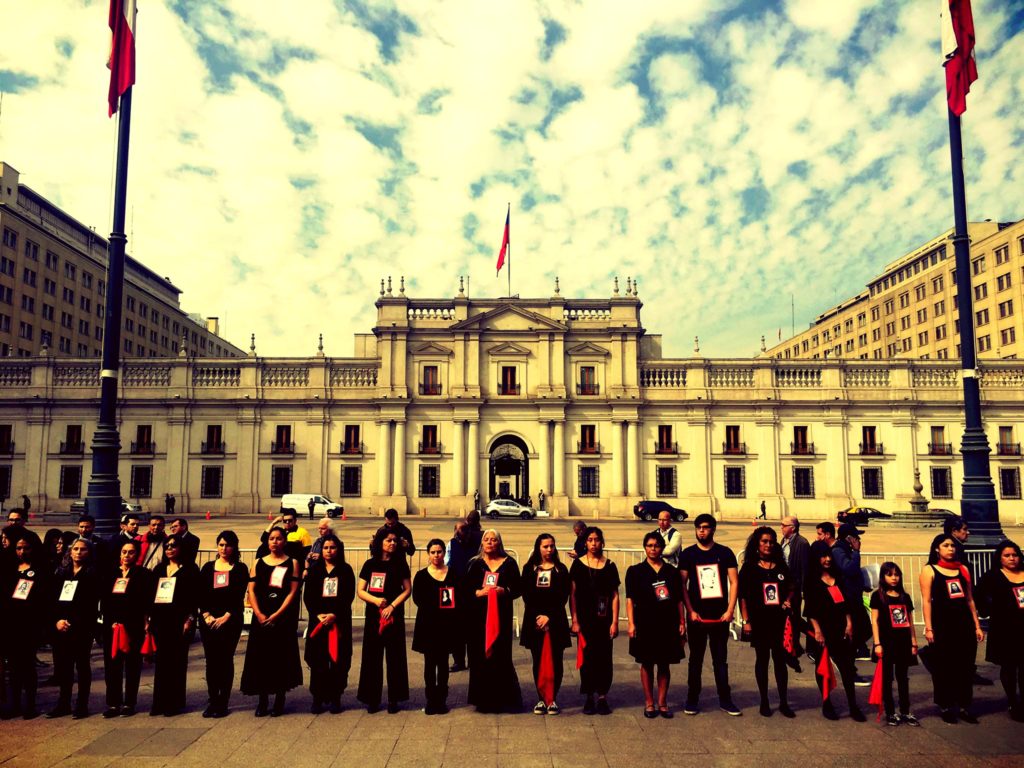
By Cí Melosa
Originally published in El Coyote, translated from Portuguese by the author.
The month? September. The day? Eleven.
The year? Oh! The year. 1973.
You thought I would say 2001, right? Yeah, this time we’ll talk about another September 11, the one that happened in 1973.
I’m not afraid of backlash. I’m a writer. I’m an anarchist. I got used to being attacked because of my positions, I’m used to be attacked because of what I write. What can I do? Writing is the way I present myself to the world. However, to anticipate the backlash, let me explain a few things.
The date of September 11, 2001 makes me very, very sad. By principles, I think (with exceptions) that lives matter. I value life and I become upset about every abrupt interruption of it. I mourn for the immigrant woman who worked as a cleaner in World Trade Center who died that day. I mourn for the Black doorman, from the Bronx, who left behind three children to raise. I mourn for the paralegal who had just graduated from law school who jumped out of the window as the building was collapsing. I mourn for the thousands of deaths. For the thousands of dreams and projects that were interrupted. I sympathize with the pain of dozens of thousands of people who didn’t die but who we will never hug their beloved ones again.
You need to understand, my dear friend, that I care for everyone who were inside of that two towers on that fateful September morning. I was only a child, twelve years-old. I came back from school earlier, because our classes were interrupted. I stayed with my family with our eyes on the TV, our hearts in our mouths and the phone in our hands, waiting to hear from our dear relatives who lived in NYC at that time. After that, I came back to NYC several times, and I never had the guts to visit Ground Zero. I did not forget. I will not forget. Neither will you. In fact, no one in the whole world will forget.

We will not forget it because it was a huge tragedy. But, also, I need to tell you something – we will not forget it because the WTC was the place where the money was. Because there were white lives there, lives that were born and raised in the Global North.
Neither should we forget the lives of the Afghans who died in the subsequent years, but we have already forgotten. There is no monument with a waterfall and their names engraved in stone for the dead Afghans. We did not sympathize with their mourning.
We do not forget the lives that went away when the planes collided with the towers, but we already forgot about the mowed lives in the mountains of the Middle East. We became accustomed to telling the story of the winners. Walter Benjamin warned us that Western society does not shape its social and political memory from the memory of the vanquished. The vanquished die not only once, but twice, if not many more times. Physiologically they died under the sight of a weapon of a well-intentioned soldier who left his beloved wife in American soil, to fed the powerful war industry. After being killed by a bullet, the vanquished dies in anonymity, in silence, in forgetfulness.
If I just tell the story of Global North, I would be killing mis hermanos from the Global South, again. If, when I mention September 11, I only remember the one that happened in 2001, I would be murdering, once again, my people, from Latin American countries, countries that were sacrificed for decades by their military dictatorships financed by blood-stained gringo dollars.
I respect all lives. I cry for all the lives unjustly killed. But, I know that the war of narratives is real. So, I’m here not to tell you what you’ve already seen on NBC, I’m here to tell you the story of my people. I’m here to tell you about the blood that flows in Latin America, to tell you how the madres and the abuelas weep without the bodies of their children and grandchildren to bury. I’m here to tell you about the youth who were born in guerrilla wombs but were kidnapped from their parents to be raised by torturers. I’m here to tell you about the crimes against humanity that were committed in my country and in the neighboring countries to mine to ensure that the Soviet ideal would not spread through Central and South America.
So, let’s talk about September 11th. But, the one that happened in 1973.
Salvador Allende was the first democratically elected socialist president in Latin America. This means – even if I think that every election is bullshit – we still live under a representative pseudo-democracy, and I need to recognize that. The system that our countries have decided to live in is the one in which a president is elected by vote. And in the 1970s the Chilean people voted, playing by the rules of the game, for Salvador Allende, a socialist, as a president.
The context? Cold War. Europe was divided, Germany was split in half by a wall. Asia and Africa were also a chessboard where the Soviets and the Americans moved their pieces at their own will. Cuba, in Latin America, was a rat with the power of a lion threatening the plans of the powerful neighbor located above it. Nothing scared Uncle Sam more than the possibility that socialism could grow in Latin America. The solution? Providing funds to nationalist groups, linked to the Armed Forces, in Latin American countries to accomplish authoritarian coups that could guarantee the maintenance of the established order. Yes, Latin American nationalism has the colors of the American flag.
In each country, the dictatorship began at different times, in Brazil, for example, it began in March of 1964, nine years before the beginning of Chilean dictatorship. So, why do we need to remember September 11, of 1973, when we talk about Latin American military dictatorships?
First of all, as I said, Allende was the first officially socialist president to be elected by vote. It became clear as water who was the enemy: leftists ideologies. Second, because the Chilean dictatorship, under the baton of Pinochet, was one of the most bloody dictatorships in the history. It is a relevant milestone to understand the history of the Great Latin Motherland. Even today Chile lives under the reminiscences of the dictator. If you go to a protest in Chile, you will definitely hear the students shutting out loud: “Se va a caer, se va a caer. La educación de Pinochet! / It will fall, it will fall. The education of Pinochet!”
Until the 1970s, Chile was one of the most developed countries in South America, and it had a stable economy. In the 1960’s there was an intense mobilization of the popular sectors. The workers’ movement of Chile was an example to the whole continent. This effervescence led to the election of Allende, who advocated for agrarian reform, free universal education, public health system, labor rights, among others flags, but always in conformity with the current institutions. If he was a socialist, no doubt he was, but it was a moderate socialism, which could not really achieve structural changes in society. But it had the power, however, to disturb the elites and bourgeoisie. The bosses’ lockout of 1972 may have been one of the greatest stoppages of the bourgeoisie in the history of humanity. They tried to avoid the election of Allende in Congress, through his impeachment, but the bourgeoisie did not reach the necessary two-third vote of the Congress. Allende ran in the elections, was elected and and became the president. But even so, the media, the judiciary, the boss and middle-class institutions were trying to do everything they could to stop him.
The Armed Forces joined the opposition to Allende. In June of 1973 tanks surrounded the Palace and killed more than two dozen people. The attempt of a coup was there for those who could see, hear or feel. On one hand, there were the Chilean national bourgeoisie, the Armed Forces, the institutions and the dirty money that came from North America, as well as extreme right-wing terrorist and paramilitary groups like Patria y Libertad. On the other hand there were an idealistic and dreamy people and a president with no support in the Congress or the Supreme Court. The coup was completed on September 11 of the same year, despite all the heroic resistance.
The Chilean Armed Force arrived in Valparaiso on the morning of September 11, escorted by United States war vessels – at the ready in the border waters of the country. A WB-575 plane – a telecommunications center – of the American area force, piloted by the US military, flew over Chile. Simultaneously 33 fighters and observation planes of the American Air Force landed in the air base of Mendonza, on the border of Argentina with Chile.
The following hours were terrifying. President Allende went to the Palacio de La Moneda [the National Palace of Chile], where he believed he would find Pinochet, whom he considered to be in his confidence. Some people may say that things that happened inside of the walls of the Palace were different from what have been told, but the official story says that, around two o’clock, Salvador Allende took a bullet to his chin, sparing himself of seeing his people being killed, being missed, and being tortured. Allende did not see the horrors of the following years in our continent, while the United States quietly plundered our lands.

September 11 of 1973 is a milestone in Latin America story, specially in the South America story. It is the concretization of the plans of imperialist domination. On September 11 of 1973 a terrible terrorist attack occurred against the lives of the Global South, also it was a frontal attack against the sovereignty of Latin America. But, usually, we don’t call terrorists those who wear uniforms and army boots, or those who have protection from the institutions of power.
In the next years, in Latin America, the silence reigned in the streets and our art and voice were censored, while in the basements of military battalions we could hear the screams of pain. Inside the houses we could hear the sounds of the muffled cry of the mothers who did not hear from their children since they were last seen attending a protest. Those who were lucky went into exile. Those who had the courage, went to the clandestinity.
But, our people are brave, and they kept fighting, even if they needed to face death and torture. All sorts of horrors were committed so that leftist beliefs could not flourish. But, our hearts are red and nobody can silence the desire for a new world. Nobody can silence a people who insist on resisting, nobody can stop a clenched fist that dares to rise.
When we look at the numbers related to all Latin dictatorships we can account for hundreds of thousands of deaths. There are thousands of bodies that we never had the chance to bury. There are thousands of survivors who will never forget the torture, the rape, the nightmare. There are hundreds of children that were kidnapped from their parent’s arms. There are countless missing people. We still wait for them, we still want them, ALIVE! Books were burned, newspapers and songs were censored. We swallowed our poems, we left paintings unpainted.
It was not one single day of terror. It was almost three decades, below and above the Equator.
In the late 1980s the dictatorships had ended, but the capitalism of dependency always reinvents itself. Now, we call it by the name of globalization. And, well, they are still killing us and shutting up our voices when we try to stop them.
We were tortured and killed. Our families still cry for us. But our story, through, the years, has been less and less remembered. Even in our countries, we almost don’t talk about this anymore, nor imagine if those who live in the Global North continue talk about this. In high school, I studied, exhaustively, about the attack against the Twin Towers. So, let me ask you something. How many of your teachers told you about the siege of the Palacio de La Moneda?
Well, I’m going to keep crying for your beloved ones who died on that fateful September 11th. The whole world will continue crying your deaths. You do not even need to ask for it. But, I’m asking you. Can you cry for our deaths too?
Cí Melosa is a Black Rose/Rosa Negra member active in New York City. She is originally from Brazil where she first became active in the anarchist movement.
If you enjoyed this piece we recommend the following articles related to Latin American politics, “We Are Not Afraid: Chilean Feminism Rises in the Face of Fascist Attacks” and “Land and Liberty: A Review of Anarchism in Latin America.”
